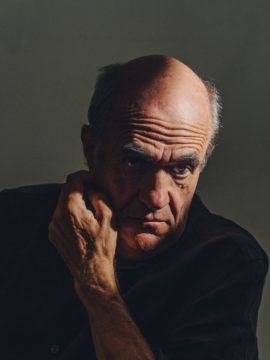D. T. Max in The New Yorker:
 The Irish writer Colm Tóibín is a busy man. Since he published his first novel, “The South,” at thirty-five, in 1990, he has written eleven more books of fiction. He has also published three reported books, three collections of essays, dozens of introductions to other writers’ work, prefaces to art catalogues, an opera libretto, plays, poems, and so many reviews that it’s surprising when a week goes by and he hasn’t been in at least one of the New York, London, or Dublin papers. When I asked Tóibín—the name is pronounced “cuh-lem toe-bean”—how many articles he had written, he could only guess. “I suppose thousands might be accurate,” he said, adding that his level of output used to be more common among writers: “Anthony Burgess, whom I knew slightly, used to write a thousand words a day. He produced a great amount of literary journalism, as well as the novels.” But, unlike Burgess, Tóibín gravitates to assignments demanding considerable diligence. Reviewing a recent biography of Fernando Pessoa, by Richard Zenith, Tóibín read the eleven-hundred-page text and three translations of Pessoa’s “The Book of Disquiet.” Tóibín sometimes assimilates his subject to the point that the writer in question begins to sound like one of his own characters. His Pessoa essay, published in August in the London Review of Books, begins, “As he grew older, Fernando Pessoa became less visible, as though he were inexorably being subsumed by dreams and shadows.”
The Irish writer Colm Tóibín is a busy man. Since he published his first novel, “The South,” at thirty-five, in 1990, he has written eleven more books of fiction. He has also published three reported books, three collections of essays, dozens of introductions to other writers’ work, prefaces to art catalogues, an opera libretto, plays, poems, and so many reviews that it’s surprising when a week goes by and he hasn’t been in at least one of the New York, London, or Dublin papers. When I asked Tóibín—the name is pronounced “cuh-lem toe-bean”—how many articles he had written, he could only guess. “I suppose thousands might be accurate,” he said, adding that his level of output used to be more common among writers: “Anthony Burgess, whom I knew slightly, used to write a thousand words a day. He produced a great amount of literary journalism, as well as the novels.” But, unlike Burgess, Tóibín gravitates to assignments demanding considerable diligence. Reviewing a recent biography of Fernando Pessoa, by Richard Zenith, Tóibín read the eleven-hundred-page text and three translations of Pessoa’s “The Book of Disquiet.” Tóibín sometimes assimilates his subject to the point that the writer in question begins to sound like one of his own characters. His Pessoa essay, published in August in the London Review of Books, begins, “As he grew older, Fernando Pessoa became less visible, as though he were inexorably being subsumed by dreams and shadows.”
More here.
